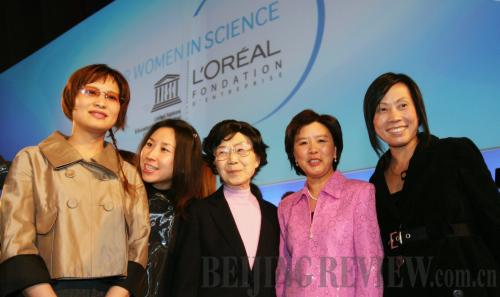|
 |
|
DEDICATED TO SCIENCE: Nancy Yuk-Yu Ip (second right) and Li Fanghua (third left), another Chinese prize winner of the L'Oréal-UNESCO Award for Women in Science, attend an event celebrating women's contributions to science in Paris on March 7, 2003 (XINHUA) |
Exploring brain science
In recent years, Ip has explored the relationship between neurotrophic factors and neuron development. She discovered three new neurotrophins and studied their characteristics and functions, as well as a cell called EphA4, which can be used to cure regression of cognitive ability.
Ip also made a breakthrough in the field when she found protein Cdk5 that weakens the ability to learn and memorize. After removing Cdk5 from the brains of a group of mice, researchers found that their learning ability was strengthened. They believe that subduing proteins such as Cdk5 may improve people's memory.
"The new medicine is being researched and developed. Basic research has been completed and we have found a pharmaceutical factory to produce it," Ip said. "The key is to find the causes of AD and how the new medicine functions in order to strengthen the efficacy of the medicine.
Most medicines for AD currently on the market have side effects, such as a heightened risk for liver disease, so many pharmaceutical factories are willing to develop and produce a new-generation medicine for AD. Ip hopes to develop one with fewer negative effects and the ability to prevent and cure AD, as well as enhance memory function in healthy people.
A Big Family
Ip said she owes her accomplishments to the support of her family. When Ip learned that she had won the L'Oréal-UNESCO Award for Women in Science in 2004, she first called her husband and then her two children and parents to inform them of the good news. "They were all very happy for me," she said.
As a businessman, her husband does not know the intricate details of her research, but he supports her work.
The scientific research field, in the eyes of many, is dominated by men. A woman has to sacrifice a lot to get ahead. Ip said she assumes the roles of mother, wife, teacher and team leader at the same time. In order to fulfill these roles, she has to balance work and family.
"It is hard to find a balance. In the past, I would have breakfast with my children, send them to school and then arrive at the office around 7:30 a.m. In the evening, I went back home for dinner, chatted with my husband and children and watched TV with them," she said. "I tried not to work at home. It is important for a working woman to communicate with her family. For me, I try to do things for my family and make them understand that I care for them."
Ip's students have also become like a second family. They love doing research with her. However, Ip does not like her students calling her "boss" as many students do on the Chinese mainland. "If they call me 'boss,' it feels as if they're doing research for me rather than for the advancement of science."
Ip said nothing makes her happier than being a teacher—even more than her numerous honors and awards.
Who is Nancy Yuk-Yu Ip?
1956: Born in Hong Kong
1977: Graduated from Simmons College in the United States
1983: Earned a Ph.D. degree in medicine at the Medical School of Harvard University
1993: Joined the Hong Kong University of Science and Technology as a scientist
2001: Elected as academician of the Chinese Academy of Sciences
2003: Won the second prize of State Natural Science Award
2004: Won the L'Oréal-UNESCO Award for Women in Science
2011: Again won the second prize of the State Award for Natural Sciences
Email us at: tangyuankai@bjreview.com | 